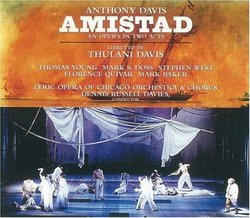| All Artists: Lyric Opera of Chicago Title: Anthony Davis: Amistad Members Wishing: 2 Total Copies: 0 Label: New World Records Release Date: 10/1/2008 Genre: Classical Style: Opera & Classical Vocal Number of Discs: 2 SwapaCD Credits: 2 UPC: 093228062721 |
Search - Lyric Opera of Chicago :: Anthony Davis: Amistad
 | Lyric Opera of Chicago Anthony Davis: Amistad Genre: Classical
"Amistad is an opera that was ten years in the making. Thulani and I first discussed the idea of making an opera on the Amistad Rebellion in 1986, after the premiere of our opera X: The Life and Times of Malcolm X. We were... more » |
Larger Image |
CD Details
Synopsis
Product Description
"Amistad is an opera that was ten years in the making. Thulani and I first discussed the idea of making an opera on the Amistad Rebellion in 1986, after the premiere of our opera X: The Life and Times of Malcolm X. We were drawn to the drama of the story, a successful uprising of captives on a slave ship, and the implications of the Amistad incident in an understanding of ourselves and the American experience. Through the Amistad, we could revisit the story of the Middle Passage, the contradictions implicit in the ethos of America, and also explore the emergence of the African-American as a cultural entity. Amistad is my most ambitious work to date and gave me the opportunity to expand upon what I learned from my previous operas as well as the chance to explore new musical areas." Anthony Davis The music of Anthony Davis (b. 1951) embodies an intercultural approach, drawing not only upon traditional and current African-American sources, but upon Javanese gamelan, American Minimalism, and the European and American avant-garde. Davis is best known for his operas. "[X: The Life and Times of Malcolm X] has brought new life to America s conservative operatic scene," enthused Andrew Porter in The New Yorker, "it is not just a stirring and well-fashioned opera that already is much but one whose music adds a new, individual voice to those previously heard in our opera houses." Amistad, Davis's fourth, is an opera in two acts with full orchestra, double chorus, and an integrated jazz ensemble with trap drums that drives its motoric rhythmic flow. In many ways, Amistad revisits aspects of Davis's previous operas, X and Tania, but in a form that exhibits maximum focus and a tightened compositional practice. The musical language is marked by constant motion and kaleidoscopic permutation of the same elements, including a four-note ending cadence that appears constantly, but in ever-shifting guises. This recording is drawn from Lyric Opera of Chicago s 1997 world-premiere performances.
Similar CDs
| Nando Reis Perfil Genres: International Music, Pop, Latin Music Label: Som Livre | |
| Rafael Bonavita, theorbo Musica Moderna Genres: Special Interest, New Age, Pop, Classical Label: Enchiriadis | |

 Track Listings (24) - Disc #1
Track Listings (24) - Disc #1


